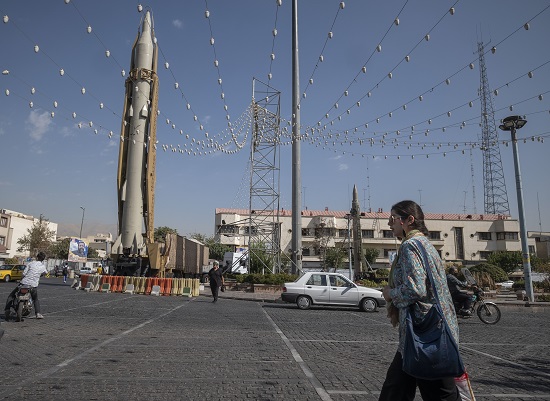
By Kayhan Life Staff
Article 75 of Iran’s 7th National Development Plan gives greater power to the Islamic Republic to monitor the daily activities of Iranian citizens and intrude in their private lives. The measure is part of the Iranian government’s plan to tighten its grip on the nation.
In an Oct. 1 article (headlined “Majlis on the Verge of Passing a Law Invading People’s Private Lives,”) the Tehran-based Shargh news online said: “Article 75 of the 7th National Development Plan is a blatant intrusion into people’s private lives.”
“The Majlis is on the verge of passing the 7th National Development Plan’s Article 75, which many Majlis deputies argue will monitor the daily activities of the Iranian people and intrude into their private lives,” Shargh noted. “This article assesses people’s religious devotion and ethical behavior.”
ANALYSIS: Islamic Republic’s Suppression of a National Movement
According to Shargh, the government will enact Article 75 through a website created by the Ministry of Culture and Islamic Guidance. The Statistical Center of Iran (SCI) and internet users on domestic data platforms will reportedly feed the relevant data and information to the website.
Under Article 75, “relevant organizations” and data platforms must “continuously” provide data to the Ministry of Culture and Islamic Guidance’s website.
“If passed, the measure will require all domestic data platforms used by the public to provide every personal detail of their users — irrespective of whether they are in or out of the city boundary — to the website, including what people buy or sell, even their food purchases,” Shargh explained.
Shargh’s article includes comments by several Majlis deputies, alarmed by the measure, which they argue violates people’s private lives.
“Article 75 of the 7th Plan is worrying because the measure goes beyond invading people’s personal space,” Jalal Rashidi-Kouchi, representing Marvdasht, Pasargad, and Sanjan electoral districts in the central province of Fars, told Shargh. “When we add this to other pieces of the puzzle, we realize that there are those who plan to monitor every aspect of people’s private lives.”
“There are some whose particular viewpoint makes them eager to violate people’s private lives,” Gholamreza Nouri Ghezeljeh, representing the Bostanabad electoral district in the northwestern province of East Azerbaijan, argued. “Invading people’s personal space is illegal.”
“Invading people’s private lives is unconstitutional,” warned Moinuddin Saeedi, representing Chabahar, Nikshahr, Kenarak, and Ghasre Ghand electoral districts in the southeastern province of Sistan and Baluchestan. “Not only am I astounded by this development, but I also am disappointed. I hope deputies act and remove this article.”
Iranian Government Conducts Massive Purge of School Principals
In an interview with Doniya-e Eghtesad on July 20, Bagher Ansari, a Shahid Beheshti University’s School of Law faculty member, said: “The problem with this article is that the private sector must share its data with others.”
Giving the government the authority to access internet users’ data is the most troubling aspect of the 7th Development Plan, given that the state security apparatus broadened its nationwide operations to harass, intimidate, and persecute ordinary citizens following the national protest sparked by the death of Mahsa (Zhina) Amini, a 22-year-old Iranian woman accused of wearing “improper hijab,” who lost her life on Sept. 16, 2022, while in the custody of the Morality Police in Tehran.
Article 75 shares the same goals as Article 15 of the “Protection Scheme,” which gives the government greater power to filter all messaging platforms.
In July 2021, the Majlis passed a draft bill on “Protecting Rights of Internet Users and Regulating Social Media Messaging Apps,” commonly known as the “Protection Scheme.” Under the scheme, Iranian authorities would filter almost all popular messaging platforms.
In March of this year, the Majlis also debated the latest version of the “Hijab and Chastity Bill,” imposing stiffer penalties on women who “do not respect the mandatory hijab.”
“Under the proposal, seven groups will be penalized: internet users, celebrities, people traveling in a car, or people in public places such as restaurants, offices, government organizations, universities, education centers, airports, terminals, and streets,” Hossein Jalali, a member of the Cultural Commission of the Majlis, said on March 26.
A coalition of conservative MPs requested the Majlis’ Judicial and Legal Commission to review the bill, with the view of inserting it into Article 85 of the Constitution. Most Majlis MPs voted in favor of the proposal on Aug. 19.
Under Article 85 of the constitution, Majlis’ commissions can review an “experimental bill” under “extraordinary conditions,” i.e., the parliament can fast-track proposals without public knowledge. For instance, 10 Majlis Judicial and Legal Commission members reviewed the “Hijab and Chastity Bill” behind closed doors, sparking a massive outcry. However, the prevailing forces in the parliament, led by Majlis Speaker Mohammad Bagher Ghalibaf, prevented the bill from being debated in an open session.
Majlis deputies supporting the “Hijab and Chastity Bill” hoped the experimental phase of the scheme would start before the anniversary of the September protests. The Majlis approved the experimental rollout of three articles of “Hijab and Chastity Law” in late September.
Although the Guardian Council has not ratified the “Hijab and Chastity Bill,” authorities have already enforced most of its articles in schools, universities, government offices, and ministries.
Since the 1979 Revolution, the Islamic Republic has held up the hijab as the cornerstone of Islamic society. However, Iranian women have shown their opposition to the mandatory hijab through civil disobedience in the past four decades.
Since coming into office in August 2021, President Ebrahim Raisi and his hardline government have tried to restrict women’s civil rights and freedoms. Article 75 of the 7th National Development Plan, Article 15 of the “Protection Scheme,” and the “Hijab and Chastity Bill” are all part of the government’s concerted efforts to tighten its grip on the Iranian nation.











